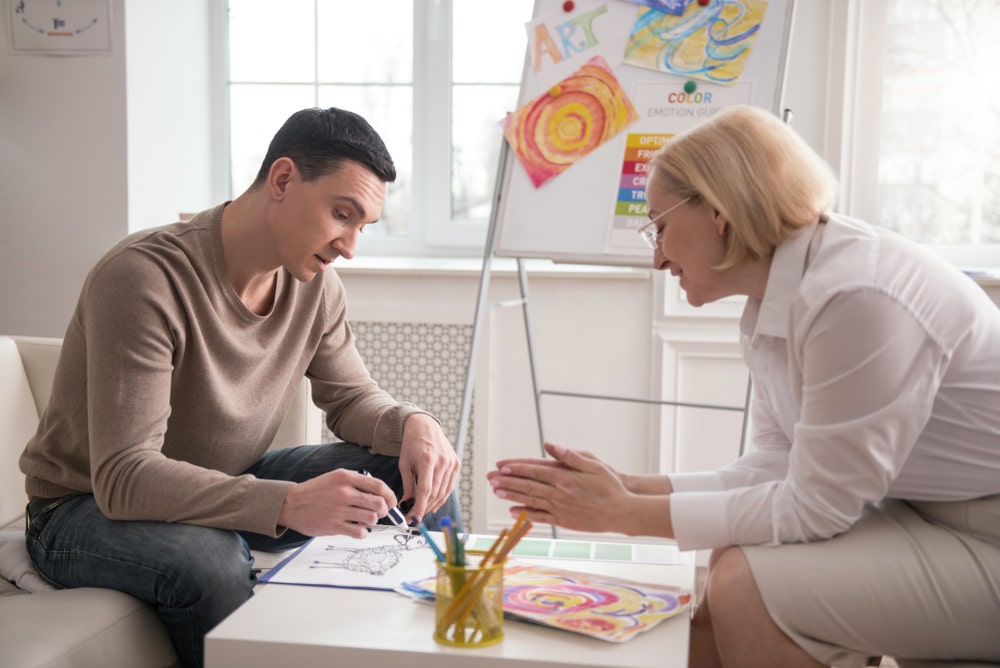Eating disorders are neurological disorders that are loosely characterized by abnormal, irregular eating habits, and an extreme concern with one’s body weight or shape. There are several different types of eating disorders listed in the Diagnostic and Statistical Manual of Mental Disorders, Fifth Edition (DSM-5), and each is categorized under the Disorder Class: Feeding and Eating Disorders. The three most common eating disorders among adolescents are anorexia nervosa, bulimia nervosa, and binge-eating disorder (BED). Although eating disorders are life-long conditions, with proper treatment and support, a teen can learn to effectively manage its symptoms. The goal of treatment for an adolescent diagnosed with an eating disorder is to help them find a healthy and sustainable relationship with food. Creative expression can be an effective way to foster mental health and well-being for teens that have trouble verbalizing their thoughts and feelings, particularly in the space of eating disorder treatment.
The Importance of Art Therapy
The American Art Therapy Association defines art therapy as “an integrative mental health and human services profession that enriches the lives of individuals, families, and communities through active art-making, creative process, applied psychological theory, and human experience within a psychotherapeutic relationship.” It is a form of experiential therapy that is facilitated by art therapists who are trained mental health clinicians that are educated in human development, clinical practice, psychological theories, and fine art. Art therapy sessions can be conducted in an individual or group setting. It can be used on its own or in conjunction with other therapeutic treatment modalities. Art therapy can be a valuable and effective form of intervention for teens with eating disorders for a variety of reasons, such as:
- Art therapy provides an arena for teens to explore self-expression, emotions, and eating disorder related challenges that may otherwise be abandoned through various art media (e.g., painting, drawing, sculpting, etc.) rather than solely relying on verbal articulation.
- Eating disorders are often driven by emotional triggers, and studies show that art therapy can help teens learn how to effective access and adaptively manage their emotions.
- Art therapy is a highly adaptable framework that affords clinicians with the flexibility to provide each teenager with a personalized therapeutic experience that is directly reflective of their nuanced needs and eating disorder treatment goals.
- Teen girls with eating disorders often have distorted body image perceptions. Art therapy allows them to externalize and visually represent their perceptions of their bodies. Creating art can help them gain insight into their body image concerns and challenge distorted beliefs that contribute to their disordered eating habits.
- Through art therapy, teenage girls can explore and develop a more positive relationship with their bodies. This process can lead to greater body acceptance and self-compassion.
Art therapy offers a unique and effective approach to addressing the emotional and psychological aspects of eating disorders in teen girls. It provides a safe and creative space for exploration, expression, and healing, ultimately supporting their journey toward improved mental health and recovery.
For Information and Support
Every family in need of mental health treatment must select a program that will best suit the needs of their family. When one member of a family struggles, it impacts everyone in the family unit. To maximize the benefits of treatment we work closely with the entire family to ensure that everyone is receiving the support they need through these difficult times.
Seeking help is never easy, but you are not alone! If you or someone you know needs mental health treatment, we strongly encourage you to reach out for help as quickly as possible. It is not uncommon for many mental health difficulties to impact a person’s life, long term. Pursuing support at the beginning of one’s journey can put the individual in the best position to learn how to manage themselves in a healthy way so they can go on to live happy and fulfilling lives.
OUR KNOWLEDGEABLE ADMISSIONS TEAM CAN BE REACHED 24/7 AT INFO@PACIFICRTC.COM OR CALL: 800-531-5769
We are available to answer any questions you may have regarding mental health treatment and our residential program, anytime. Contact us today using the form to the right.






